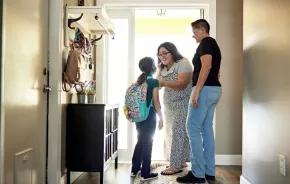
It is late in the day and I am sitting with a woman who is hunched over, shaking and wiping her eyes with a balled-up, soaking tissue.
In her life outside my office, this crumpled-up woman is a dynamo. She is sharp as a tack, prominent in her field, charming to her friends and formidable to her enemies. With me, she is vulnerable, a baby bird with a broken wing. We are discussing her childhood memories.
“It’s not the abuse, per se,” she says, using the cerebral, legal language of distance, dissociation and categorization that abuse survivors often turn to in order to minimize their hurt.
“What is it?” I ask.
“It’s what she said when I told her he was touching me down there,” she says.
“What did she say?”
“She told me I was older now, and shouldn’t be wearing tank tops around the house.” She looks down, pointing to her breasts, “As if it was my fault I had these things.”
As a trauma therapist, I have heard hundreds of these stories. The details vary, but one thing is consistent: The emotional devastation persists well beyond the abuse.
I’ve come to see that there is something possibly even worse than the sexual abuse of a child, and that is when a parent responds to the child’s report in a way that blames the child, minimizes the horror, or conveys in any of a hundred ways “your safety isn’t important.”
Many children avoid divulging their abuse in part because this secondary trauma — that is, the failure of protection by the people in charge — is so emotionally distressing. Among my clients who were sexually abused as children — with very few exceptions — the most damage isn’t from the abuse, it’s from an incompetent system response.
An “incompetent system response” may sound clinical, but it’s a useful label because it conveys failure without malicious intent. And usually, that’s why these failures occur: Not because the parent doesn’t care, but because they do not know what to say or do, so they retreat into their own defense mechanisms of minimization, denial and blame.
As a very public (and frankly quite crazy) example of denial, consider Freud’s “penis envy” concept, created in response to his utter disbelief that so many of his women patients had been sexually abused as children. Girls express anxiety because they want a penis. Right … just like boys wish they menstruated.
The very human tendency to withdraw, dismiss or avoid in the face of tragedy is common and has a terrible impact. You see this when someone receives a cancer diagnosis and all of a sudden their friends withdraw as rapidly as their hair falls out. Or when someone who is going through a divorce is no longer invited over.
What should you say and what can you do when someone you care about has been injured or abused? If you are a grown-up and that someone is a child, first and foremost you must immediately attend to their safety. Remove the perpetrator’s access to the child, and then file a police and Child Protective Services (CPS) report. If you can’t get the perpetrator out because it’s his place you live in, move out with the child. If you can’t afford your own place, contact a women’s shelter to seek temporary housing. Even when the perpetrator no longer has access to the child, you still need to make a police and CPS report. As a grown-up you are responsible for the safety of children at large, not just your own, and pedophiles will find new victims.
Believe the child, immediately and completely. Children may lie about many things — how many pieces of candy they ate, how much homework they have, how much time they have spent playing video games. But children do not lie about being sexually molested. If anything, they under-report the recency, frequency and severity of sexual abuse because they feel ashamed. Believe them and tell them that you believe them.
After you have ensured the child’s physical safety, attend to their emotional needs. Start by apologizing to them that this happened. They are a kid and you are a grown-up, and even though you didn’t abuse them, they deserved to be protected and so therefore they deserve to be apologized to for not being protected. Tell them, over and over, “What he did to you was wrong, and it was not your fault.”
Provide physical comfort. Sexually abused children need to replace exploitative physical contact with nurturing, loving physical contact. Offer hugs, offer cuddles, offer to sit next to them on the sofa when you watch a show together.
Seek professional help for yourself and the child. Give your child the gift of protection, time, patience and professional support. You both deserve to heal. Help is available.
Where to turn for helpThe Sexual Assault and Traumatic Stress Clinic at Harborview Medical Center (206.744.1600) offer medical assessments as well as therapy services. If your child is in physical pain due to sexual abuse, this should be your first phone call. In addition to providing a medical assessment of damage and documenting their findings in a manner consistent with court requirements, they can help both you and your child access mental health support services. RAINN (800.656.HOPE) is the nation's largest anti-sexual violence organization, and its telephone hotline provides resources as well as a range of free services, including:
If the perpetrator is a parent or caregiver, make a CPS report. In King County, that means calling the Washington State Department of Youth and Families at 1-800-609-8767. They will ask for:
You do not need to have all of the above information when you call to make a report, but the more accurate information you can provide, the better equipped the offices will be to assess the child's safety. Sometimes CPS intake workers can be a little curt, so I recommend having a friend or advocate sit with you when you make this phone call. If the perpetrator is a non-caregiver (neighbor, coach, teacher, babysitter, stranger), call the police. In Seattle, the non-emergency phone number is lightly staffed and therefore rarely answered, so you will need to either go to the nearest local police department to make your report in person or call 9-1-1 and they will send someone out to take your full statement. DomesticShelters.org provides information and phone numbers for numerous domestic violence shelters and emergency housing options for women and children leaving unsafe home environments. Please note that you will not be able to search for domestic violence shelters by location. To provide safety for the residents, the exact location is kept private until admission. |











